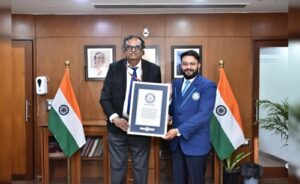J.R.D. Tata (Jehangir Ratanji Dadabhoy Tata) is often considered the first Indian to become a licensed pilot, achieving this feat in 1929. He is a legendary figure in Indian aviation and a key contributor to the country’s industrial growth. Here are some important details and news surrounding his achievements and legacy:
Born: July 29, 1904, in Paris, France, to a prominent Parsi family. His father was Ratanji Dadabhoy Tata, a member of the famous Tata family. He was educated in India and Europe, where his passion for aviation developed. He was particularly inspired by the growing global interest in flying during the early 20th century.
In 1929, at the age of 25, J.R.D. Tata became the first person in India to obtain a pilot’s license, a remarkable achievement at a time when aviation was in its infancy. He was trained in flying in Europe, first in England and then in France.
On October 15, 1932, J.R.D. Tata made history by piloting the first-ever commercial flight in India. The flight was from Karachi (now in Pakistan) to Bombay (now Mumbai), a distance of 1,000 km.
This was the beginning of Tata Airlines, which would later evolve into Air India — India’s national airline.
In 1932, Tata Airlines was founded by J.R.D. Tata as a subsidiary of the Tata Sons Ltd. Initially, the airline operated as a small air mail service, but over the years, it expanded into full-fledged passenger services.
In 1946, Tata Airlines was rebranded as Air India, and in 1953, Air India became the national carrier of India under the government’s ownership, though J.R.D. Tata remained involved with its development.
J.R.D. Tata was instrumental in the development of Indian aviation and in fostering the growth of civil aviation in India.
He was also a founding member of the Indian National Committee of the International Chamber of Commerce (ICC) and had a vision for India’s economic and industrial advancement.
He was also known for his contribution to various sectors including steel (founding Tata Steel), hospitality (with the creation of the Taj Hotels), and more.
Bharat Ratna: In 1992, J.R.D. Tata was posthumously awarded India’s highest civilian award, the Bharat Ratna, for his immense contribution to the nation, especially in the fields of aviation, industry, and philanthropy.
Padma Vibhushan: He was also honored with the Padma Vibhushan in 1955, one of India’s highest civilian awards.
Tata’s involvement in aviation continued well beyond his pioneering days. He was the longest-serving chairman of Tata Sons, holding the position from 1938 to 1993.
His vision for Air India was not only to connect India with the world but also to establish India as a global leader in the aviation industry.
Although Air India was nationalized in 1953, J.R.D. Tata’s legacy still lives on in the company. After years of government control, in 2021, the Indian government sold Air India back to the Tata Group, reuniting the airline with its original founder’s vision.
“I do not believe in taking the right decision, I take a decision and make it right.”
“The objective of management is not to maximize profit but to make it work for the greater good of society.”
J.R.D. Tata’s life and achievements have been the subject of numerous books, documentaries, and biographical films. He remains one of the most revered business magnates in Indian history.
J.R.D. Tata was a true visionary whose contributions to aviation and the growth of Indian industry continue to inspire. His achievements in the field of aviation marked the beginning of modern air travel in India, and his leadership of the Tata Group set the foundation for the growth of India’s industrial sector. The Tata Group, under his leadership, became synonymous with integrity, innovation, and nation-building.







